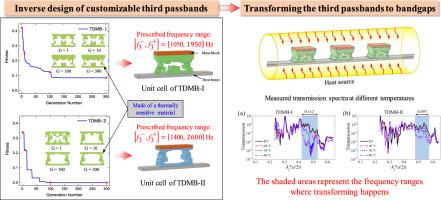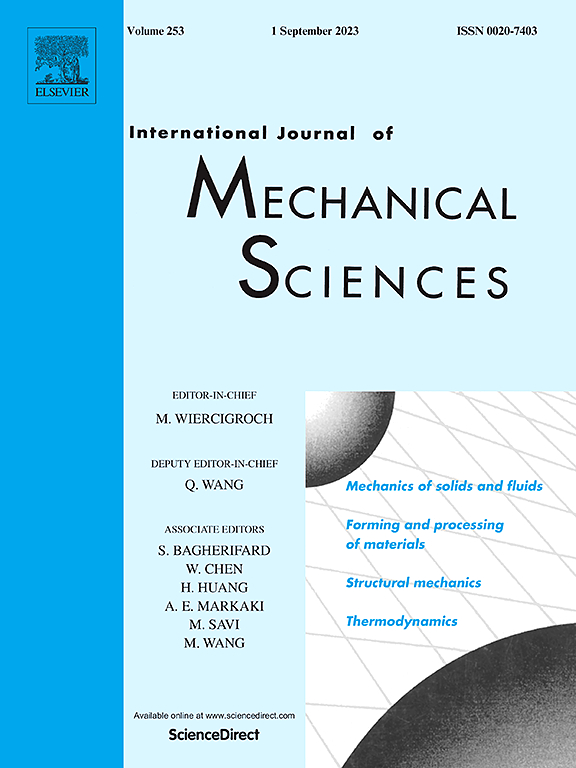Transformative elastic metamaterials: Temperature-induced passband-to-bandgap conversion
IF 7.1
1区 工程技术
Q1 ENGINEERING, MECHANICAL
International Journal of Mechanical Sciences
Pub Date : 2024-10-04
DOI:10.1016/j.ijmecsci.2024.109767
引用次数: 0
Abstract
Elastic metamaterials favor the wide bandgap generation, but their formation mechanisms impose certain constraints on the achievable locations and widths. To overcome this limitation, this study proposes an innovative method that optimizes specific passbands and subsequently transforms them into bandgaps through an external stimulus. As an illustration, two meta-beams with different third passbands are optimized. In addition, to examine the formation and transformation mechanisms of the optimized passbands, this study develops several meta-beam models, incorporating force neutralizers, moment neutralizers, and their hybrid combinations, which are modally equivalent to the optimized unit cells. Samples for the two optimized meta-beams are fabricated using a three-dimensional printing technique. The experimental measurements are conducted at both room temperature and elevated temperatures, and the results confirm that when the temperature increases to approximately 60 °C, the optimized third passbands transform into bandgaps. Furthermore, repeated thermal loading cycles substantiate the reversibility of this transformation, demonstrating a promising application potential of the proposed method to tunable broadband meta-beam designs.

变革性弹性超材料:温度诱导的通带-带隙转换
弹性超材料有利于产生宽带隙,但其形成机制对可实现的位置和宽度有一定的限制。为了克服这一限制,本研究提出了一种创新方法,即优化特定通带,然后通过外部刺激将其转化为带隙。举例来说,两个元波束的第三通带不同,但都得到了优化。此外,为了研究优化通带的形成和转化机制,本研究开发了几种元梁模型,包括力中和器、力矩中和器及其混合组合,它们在模态上与优化单元等效。两个优化元梁的样品是用三维打印技术制作的。实验测量在室温和高温下进行,结果证实,当温度升高到约 60 ℃ 时,优化的第三通带会转化为带隙。此外,反复的热加载循环证实了这种转变的可逆性,证明了所提出的方法在可调谐宽带元光束设计中具有广阔的应用前景。
本文章由计算机程序翻译,如有差异,请以英文原文为准。
求助全文
约1分钟内获得全文
求助全文
来源期刊

International Journal of Mechanical Sciences
工程技术-工程:机械
CiteScore
12.80
自引率
17.80%
发文量
769
审稿时长
19 days
期刊介绍:
The International Journal of Mechanical Sciences (IJMS) serves as a global platform for the publication and dissemination of original research that contributes to a deeper scientific understanding of the fundamental disciplines within mechanical, civil, and material engineering.
The primary focus of IJMS is to showcase innovative and ground-breaking work that utilizes analytical and computational modeling techniques, such as Finite Element Method (FEM), Boundary Element Method (BEM), and mesh-free methods, among others. These modeling methods are applied to diverse fields including rigid-body mechanics (e.g., dynamics, vibration, stability), structural mechanics, metal forming, advanced materials (e.g., metals, composites, cellular, smart) behavior and applications, impact mechanics, strain localization, and other nonlinear effects (e.g., large deflections, plasticity, fracture).
Additionally, IJMS covers the realms of fluid mechanics (both external and internal flows), tribology, thermodynamics, and materials processing. These subjects collectively form the core of the journal's content.
In summary, IJMS provides a prestigious platform for researchers to present their original contributions, shedding light on analytical and computational modeling methods in various areas of mechanical engineering, as well as exploring the behavior and application of advanced materials, fluid mechanics, thermodynamics, and materials processing.
 求助内容:
求助内容: 应助结果提醒方式:
应助结果提醒方式:


